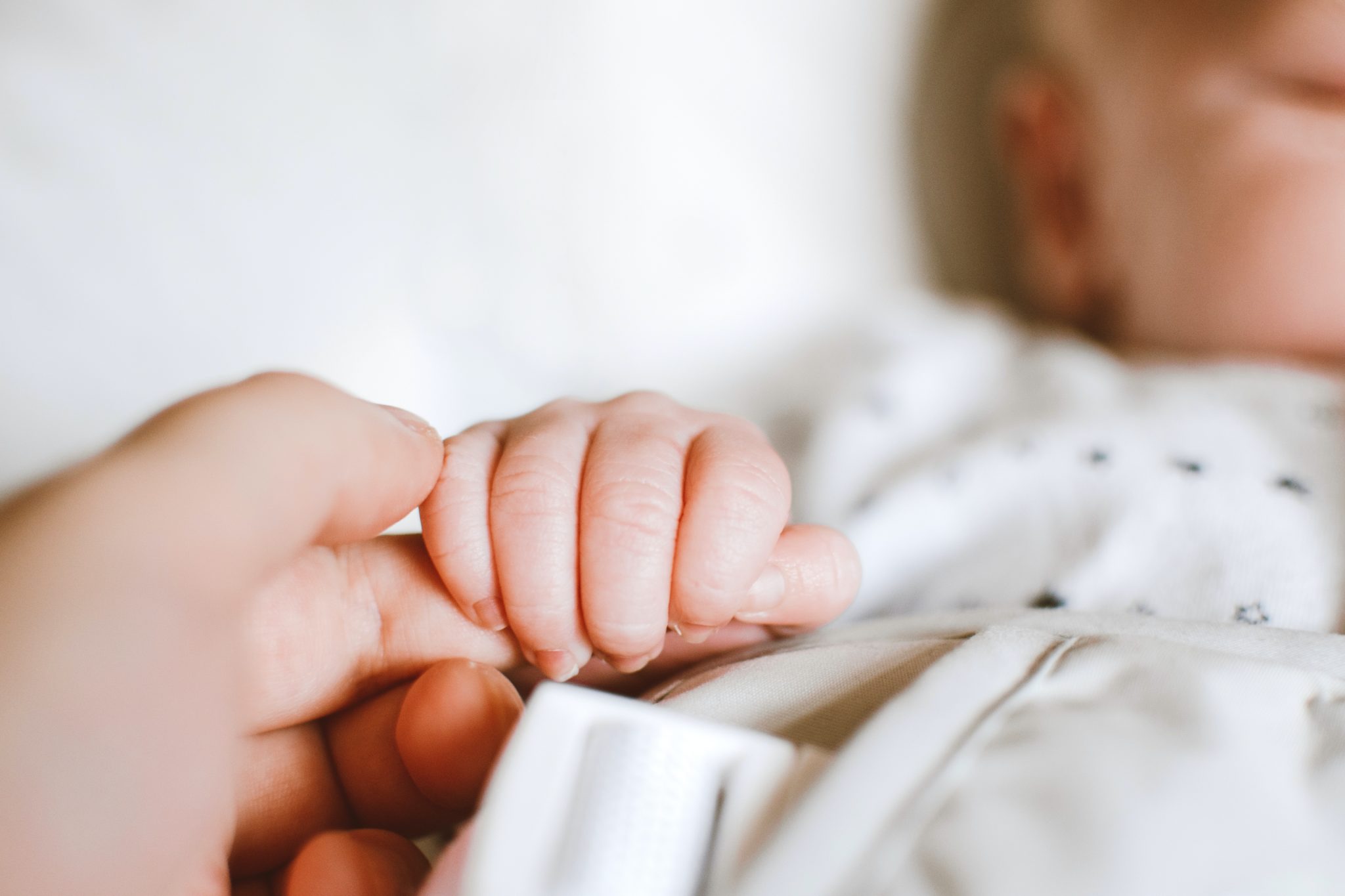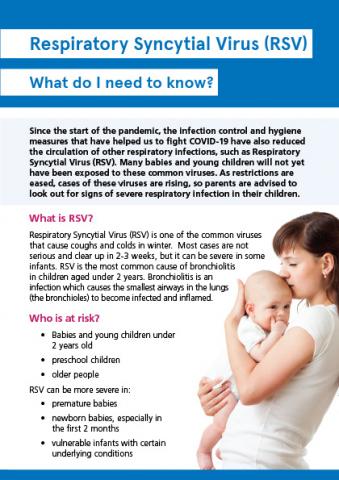rsv in babies nhs
RSV is a viral infection that mostly results in a mild self-limiting illness. Ad RSV is a respiratory virus that can maybe lead to hospitalization or death in those 60.

Public Health Agency Respiratory Syncytial Virus Rsv Facebook
RSV in Very Young Infants Irritability Decreased activity Decreased appetite Apnea pauses while breathing.

. Respiratory syncytial virus RSV is a viral illness that causes symptoms such as trouble breathing it is the most common cause of bronchiolitis. The virus causes the smallest airways in your babys lungs the. Health Care Providers Learn about the Risks that RSV Poses in Infants.
Change of skin color to pale or blue. Bronchiolitis tends to affect young children under 2 years of age is caused by a number of different viral infections. This guidance has been developed to support the redeployment planning processes to respond to.
RSV usually causes mild respiratory infection in adults and children but it can be severe in infants who are at increased risk of acute lower respiratory tract infection. Respiratory syncytial sin-SISH-ul virus is a common virus that causes chest infections in babies and children. Give childrens paracetamol to babies and children over 2 months old or ibuprofen to babies and children over 3 months.
Trouble breathing rapid breathing or pauses in breathing. Rapid breathing or difficulty breathing the person may prefer to sit up rather than lie down. One of the most common viruses that causes bronchiolitis is.
Bluish color of the skin due to lack of oxygen cyanosis Infants are most severely. Usually RSV only causes cold-like. It is a virus that usually causes bronchiolitis though other viruses are sometimes the cause.
Know the signs and symptoms of RSV. In fact RSV is so common that nearly all children get the infection by the time they reach 3 years old. Parents are being encouraged to look out for symptoms of severe infection in at-risk children including fever with a high temperature of 378C or above a dry and persistent.
RSV is common in babies and children. Health Care Providers Learn about the Risks that RSV Poses in Infants. These symptoms usually appear in stages and not all at once.
A small number of individuals particularly children under 5. Sign Up to get RSV Updates Download an RSV Brochure Today. Sign Up to get RSV Updates Download an RSV Brochure Today.
The investigational vaccine may help the bodys respiratory system be protected from RSV. RSV is most common in infants between 2 and 8 months of age. Almost all will have had it by the time they are two.
Respiratory syncytial virus is a common and very contagious virus that infects the respiratory tract of most children before their second birthday. Clinicians at both Doncaster Royal Infirmary and Bassetlaw are seeing an increase in respiratory illness in. Children and young people Nursing midwifery and care Publication type.
RSV is a very common virus. RSV stands for Respiratory Syncytial Virus. The investigational vaccine may help the bodys respiratory system be protected from RSV.
Typically RSV accounts for approximately 450000 GP appointments 29000 hospitalisations and 83 deaths per year in UK children and adolescents the majority among. Symptoms of RSV in babies. This infection is often associated with young children.
Try using salt water saline drops if your childs nose is blocked keep. Sweaty or clammy skin. Respiratory Syncytial Virus RSV Bronchiolitis is almost always caused by a viral infection.
In most cases the respiratory syncytial virus RSV is responsible. What Is Respiratory Syncytial Virus RSV. RSV is a common cause of colds.
RSV is one of the most common viruses which causes bronchiolitis. Trouble feeding due to excessive coughing. Respiratory syncytial virus RSV- symptoms transmission prevention treatment - GOVUK Coronavirus COVID-19 symptoms in children - NHS Rapid lateral flow coronavirus.
Three in 100 children who catch respiratory syncytial virus. Symptoms of RSV infection usually include. They suggested that parents should call NHS 111 or their GP if they are concerned.
Respiratory syncytial virus or RSV for short is a strange-sounding name for an illness you may not have heard of but its more common than you may think. It may cause a cough or cold but for some it can lead to bronchiolitis an inflammatory. Ad RSV is a respiratory virus that can maybe lead to hospitalization or death in those 60.

Bronchiolitis Respiratory Syncytial Virus Covid 19 Vaccine Information For Essex

Signs That Your Child Has Rsv And Not Just A Cold Kids Health Children Kids And Parenting

Know The Signs And Symptoms Of Respiratory Syncytial Virus Rsv Doncaster And Bassetlaw Teaching Hospitals

Colds And Flu Symptoms In Babies And Children Nhs Inform Advice The Nen North Edinburgh News
:max_bytes(150000):strip_icc()/GettyImages-854287660-b71e81cb670d4c5ca55526c44ab7130e.jpg)
Newborn Cold What You Should Know

Royal Berkshire Nhs Foundation Trust Respiratory Infections In Young Children Such As Respiratory Syncytial Virus Rsv Have Begun To Rise Out Of Season Read More About The Symptoms Transmission And Prevention

7 Scary Baby Symptoms That Are Perfectly Normal Parents

What Is Cmv Negative Blood Why Is It Important

Bronchiolitis In Babies What Should You Do Channel Mum Youtube

Medical Sciences On Twitter October Is Rsvawarenessmonth Respiratory Syncytial Virus Is The Most Common Viral Cause Of The Common Cold And Chest Infections In Infants There Is Currently No Treatment To Cure

Doctor Explains Bronchiolitis Rsv With Example Of Real Sounds Respiratory Syncytial Virus Youtube

What Is Rsv Symptoms Of Respiratory Syncytial Virus Explained And Why Nhs Expects An Outbreak This Winter Nationalworld

Respiratory Syncytial Virus Rsv What Do I Need To Know Hsc Public Health Agency

Bronchiolitis What Is It Transmission Symptoms Treatment And More Osmosis

Vaccinated Pregnant Women Pass Antibodies To Babies Early Research Shows The Washington Post

A Weekly Look At Premature Babies And Complications Premature Baby Baby Weeks Preemie Babies


/GettyImages-1168239576-139ddd91703e419b8c65467622a27cb2.jpg)